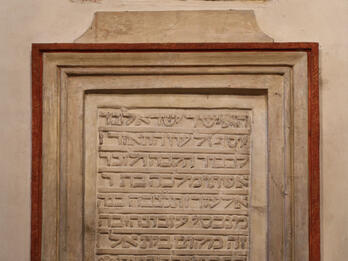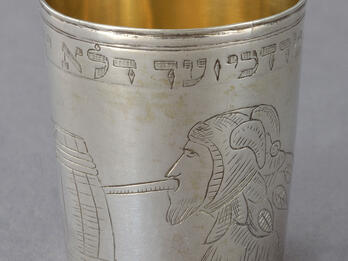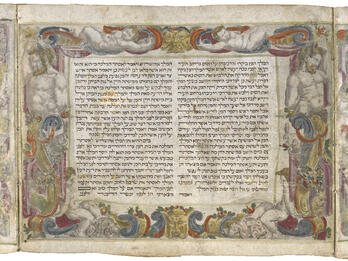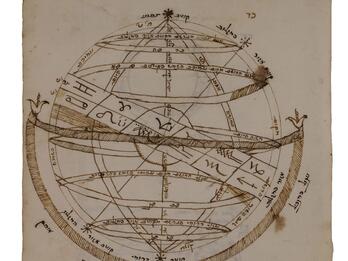Commentary: On the Pentateuch
And Jacob dwelt in the land of his father’s sojourning, in the land of Canaan (Genesis 37:1): In that part of the land of Canaan where his father had lived, similar to the verse: [To Mamre, to Kiryat Arba—which is Hebron,] where Abraham and Isaac sojourned [Genesis 35:27].
These are the generations of Jacob (Genesis 37:2): The events of his life, and what occurred to him after he settled there. For his experiences after leaving his father’s house correspond to that which transpired to us in the first exile, and that which happened to him after he returned to the land of his father’s sojourning is like that which occurred to us in the Second Temple period, including the destruction, exile, and the redemption at the end of days.
Was shepherding with his brethren the flock (Genesis 37:2): He would lead and instruct them in how to shepherd sheep.
And he was a lad (Genesis 37:2): Due to his youth, he sinned by bringing an evil report about his brothers, as he was inexperienced and failed to reflect upon the consequences of his actions. This occurred despite the fact that at the time he was already very knowledgeable and he would later become an instructor to the elders of the generation, as it says: [Joseph was sold for a servant . . . ] and to teach his elders wisdom (Psalms 105:17, 22). As the sages, of blessed memory, have said: There is no wisdom in youth [b. Shabbat 89b].
And Joseph brought evil reports of them (Genesis 37:2): By informing his father that his brothers would make mistakes and cause losses by failing to pay proper attention in the labor of shepherding, which at the time offered them their main means of gaining wealth and property.
And he made him a coat of many colors (Genesis 37:3): As a sign that he would be the leader both at home and abroad. This idea is expressed in the verse: And I will clothe him with your robe (Isaiah 22:21). As the sages, of blessed memory, have said, regarding an eldest brother, that his words will be accepted [see b. Bava Kamma 11b].
And his brothers saw that their father loved him (Genesis 37:4): Jacob erred here by showing his preference for one brother over the others so openly that they became aware of the special love that he harbored for that son [see b. Shabbat 10b].
And they could not speak peaceably to him (Genesis 37:4): Although they had no choice but to talk to him regarding household matters and shepherding, because he had been appointed the leader by their father, nevertheless they were unable to converse with him in peace and friendship, in the manner of brothers.
And he told it to his brothers (Genesis 37:5): This was also an ill-advised decision, due to his youth.
Hear, please, this dream (Genesis 37:6): Not only did he relate the dream itself to them, but he introduced it with the phrase “hear, please,” which means, “understand the meaning of the dream.” This merely increased his brothers’ enmity towards him, as indicated by their response: Shall you indeed reign over us? (Genesis 37:8).
And also stood upright (Genesis 37:7): This was a sign that his reign would last for a lengthy period, as was indeed the case, for he ruled for eighty years, longer than any of the kings mentioned in Scripture.
For his dreams (Genesis 37:8): For the manner in which he related the details of the dream, making it clear that he wanted the dream to be fulfilled for him.
And for his words (Genesis 37:8): His comment, “hear, please,” by which he instructed them to pay attention and grasp the meaning of the dream.
What is this dream (Genesis 37:10): The idea that you will rule over us stems from nothing other than the evil imaginings of your heart, as your own thoughts came upon your bed (Daniel 2:29).
And his brothers envied him (Genesis 37:11): They felt that it was because of his special closeness to his father that he had the arrogance to relate such matters in their father’s presence.
But his father kept the saying in mind (Genesis 37:11): In his opinion, it was a true dream, and he waited with anticipation for its fulfillment. This is as the sages, of blessed memory, have said: A person can be jealous of everyone except for his son and his student [b. Sanhedrin 105b].
Aren’t your brothers shepherding in Shechem (Genesis 37:13): which is not far away.
Go now, see (Genesis 37:14): Use your discernment to observe their situation, and fix anything that they are doing wrong, if necessary. If Jacob had wanted merely to know the facts, he could have simply sent one of his servants.
He sent him out of the vale of Hebron (Genesis 37:14): Jacob accompanied him until they reached the vale.
Wandering in the field (Genesis 37:15): He was going back and forth from one place to another, in an attempt to find the spot where they were shepherding.
What do you seek (Genesis 37:15): as you are not walking in a straight direction.
Where they are shepherding (Genesis 37:16): in which part of this place.
They have left here (Genesis 37:17): There is no doubt that they have left the pasture here, and there is no point looking for them in any corner of this place.
For I heard them say (Genesis 37:17): The reason I say that they have definitely left is because I heard them say “let us go,” not that I actually saw them leave.
After his brothers (Genesis 37:17): Even though he did not find them in Dothan, as his father had stated, he went above and beyond his father’s instructions in order to achieve what his father wanted.
They conspired against him to slay him (Genesis 37:18): The root nakhal [conspire] denotes a plan to do evil, as in the phrase with which they have beguiled [nikhlu] you (Numbers 25:18). The verse is saying that they considered Joseph a schemer [nokhel] who is worthy of death. They felt that he was not coming to them in peace, but that he sought to conspire against them, or to cause them to sin so that their father would curse them or God would punish them, and thus he would be left as the one blessed above all the other sons [see Deuteronomy 33:24]. Now the reflexive grammatical form hitpa‘el in this instance is indicative of imagination and design, similar to the verse: Do you lay a snare [mitnakesh] for my life (1 Samuel 28:9), that is, you design in your mind how to snare and kill me. The phrase “to slay him” means that they thought that Joseph wished to slay his brothers, as in the phrase: To have you do them (Deuteronomy 4:14), and: To have you enter into the covenant (Deuteronomy 29:11).
Scripture is teaching us here how the brothers could possibly have committed this act. Since they were all wholly righteous individuals, to the extent that their names would be etched as a memorial before God [see Exodus 28:29], how could they have all agreed to kill their brother or to sell him into slavery? They did not even regret their evil deed, for even when they later declared: In truth, we are guilty regarding our brother (Genesis 42:21), they did not admit to any guilt for his sale or possible death, but rather for their cruelty, when he beseeched (Genesis 42:21). Therefore, the verse explains that they thought that Joseph was a schemer who was plotting their demise in this world or the world to come, or perhaps both worlds, and the Torah instructs us that if someone comes to kill you, kill him first [see, e.g., b. Berakhot 58a].
Behold the dreamer (Genesis 37:19): The one who related his dreams to us in order to enrage us so that we would rise up against him and sin to God, or to our father, or both of them, and we would thereby cause our own downfall.
Come now (Genesis 37:20): They sprang into action and agreed to kill him.
And we will say, an evil beast has devoured him (Genesis 37:20): to prevent our father from growing angry and cursing us.
And we shall see what will become of his dreams (Genesis 37:20): the dreams which he had related, which indicated that he would rise to greatness and rule over us. Then we will see that his dreams will be false, as nothing will become of them and they will be left unfulfilled.
And he delivered him out of their hand (Genesis 37:21): by preventing them from performing a hasty action, of the type that can do irreparable harm. Even the righteous can sometimes make mistakes of this kind, just as Reuben himself had sinned with Bilhah, regarding which his father said that he was unstable as water (Genesis 49:4).
But lay no hand upon him (Genesis 37:21): do not act cruelly toward him, as in the verse: Out of the wicked comes forth wickedness; but my hand shall not be upon you (1 Samuel 24:13).
That he might deliver (Genesis 37:21): To raise him out of the pit at a later stage.
And they sat down to eat bread (Genesis 37:25): In their eyes, this was not a problematic occurrence that would cause any interruption to their regular mealtime. Such an attitude, after an unfortunate event had come about through them, was unworthy of these righteous men. This contrasts with the behavior of Israel after they killed virtually all the men of the tribe of Benjamin, regarding which the verses state: And they sat [there] until the evening before God, and they lifted up their voices, and wept greatly, and they said: “Lord, God of Israel, why has this come to pass in Israel?” (Judges 21:2–3). This was also the reaction of Darius after he threw Daniel into the lions’ den: And he passed the night fasting; neither were diversions brought before him (Daniel 6:19).
They acted in this manner because they thought Joseph was a pursuer, and the law is that whoever steps forward and kills such a person is considered meritorious, in a situation where there is no other way to rescue the person who is being pursued other than by killing the one chasing him.
Going to carry it down to Egypt (Genesis 37:25): Only the owners of the camels were there, not the owners of the merchandise itself, and therefore their work would be finished when they brought the goods down to Egypt.
What profit (Genesis 37:26): What would be the use of such an act? For there are two purposes in taking revenge: First, to repay evildoers in accordance with their deeds. But here, if we kill our own brother, we will repay evil to ourselves as well, as we will be upset over his death and over our cruelty against him. Second, to scare those left behind, that they may hear and fear [see, e.g., Deuteronomy 17:13] harming us. However, this effect will not be achieved either, as we will conceal his death.
And conceal his blood (Genesis 37:26): to preserve our own honor, and out of fear of our father.
Come, and let us sell him (Genesis 37:27): and he will thereby be punished measure-for-measure; instead of ruling over us, as he imagined, he will become a slave.
Midianites, merchantmen (Genesis 37:28): These were the owners of the merchandise that was being carried by the Ishmaelites’ camels.
And they sold Joseph to the Ishmaelites (Genesis 37:28): They conducted the sale with the Ishmaelites, who represented the Midianite merchants. The brothers did not want to speak with the merchants directly, in case they recognized them, as they would sometimes station themselves in different towns to sell their wares. Instead, they addressed and performed the transaction with the owners of the camels, who would not stop in the towns, but rather would merely pass through them. Nevertheless, the actual buyers were the Midianites, as it states below: and the Midianites sold him into Egypt (Genesis 37:36).
A similar thing occurred to us in the Second Temple period: some of us sold others of us to the gentiles, especially when the Hasmonean kings were besieging one another, at a time when Israel was subjugated to the Romans. This led to our exile, just as occurred with the sale of Joseph, for the events unfolded in such a manner that our forefathers ended up going down to Egypt, as the sages, of blessed memory, have stated [see b. Shabbat 10b].
Credits
Published in: The Posen Library of Jewish Culture and Civilization, vol. 5.







